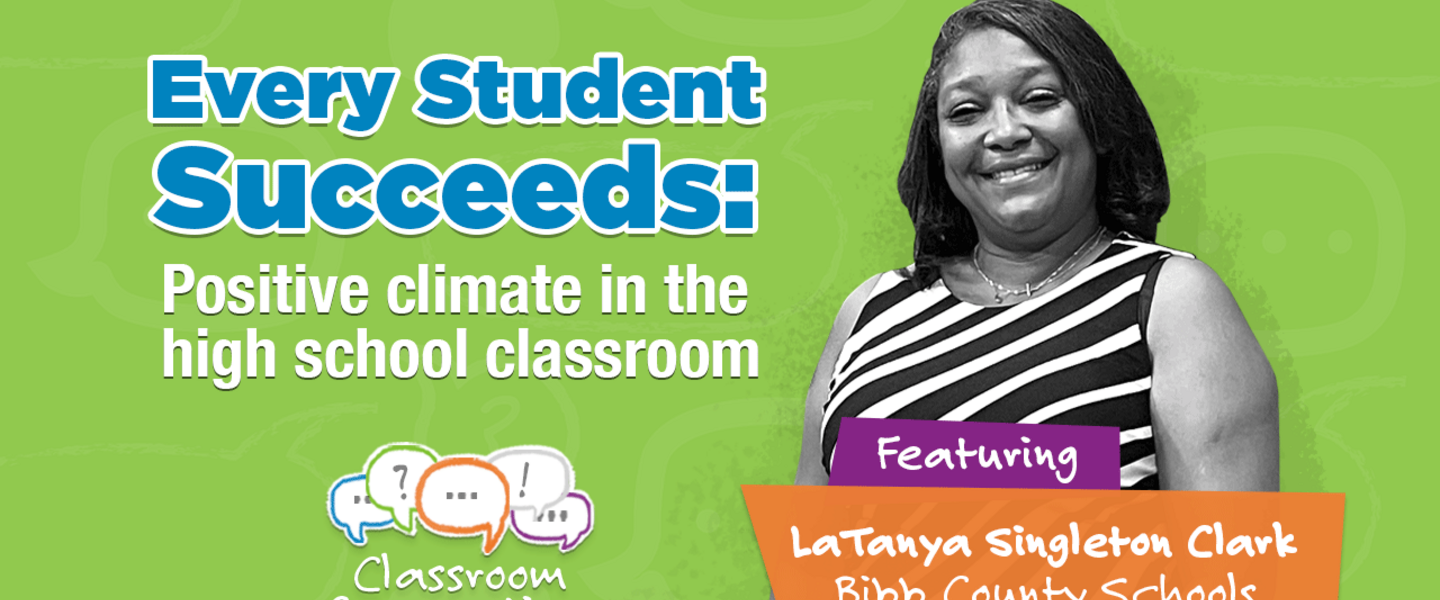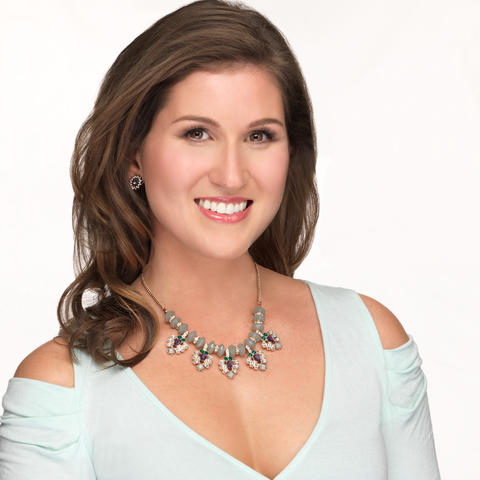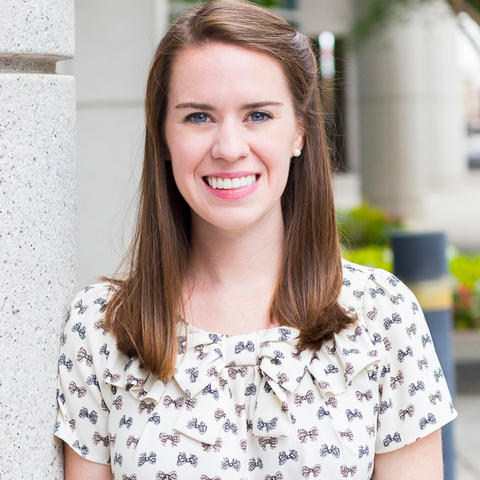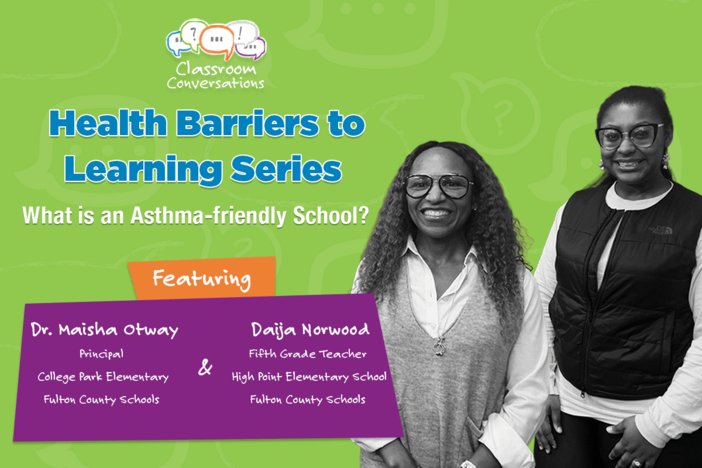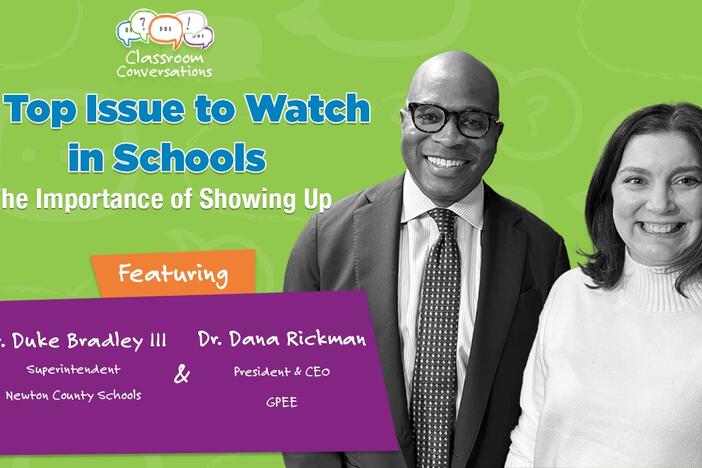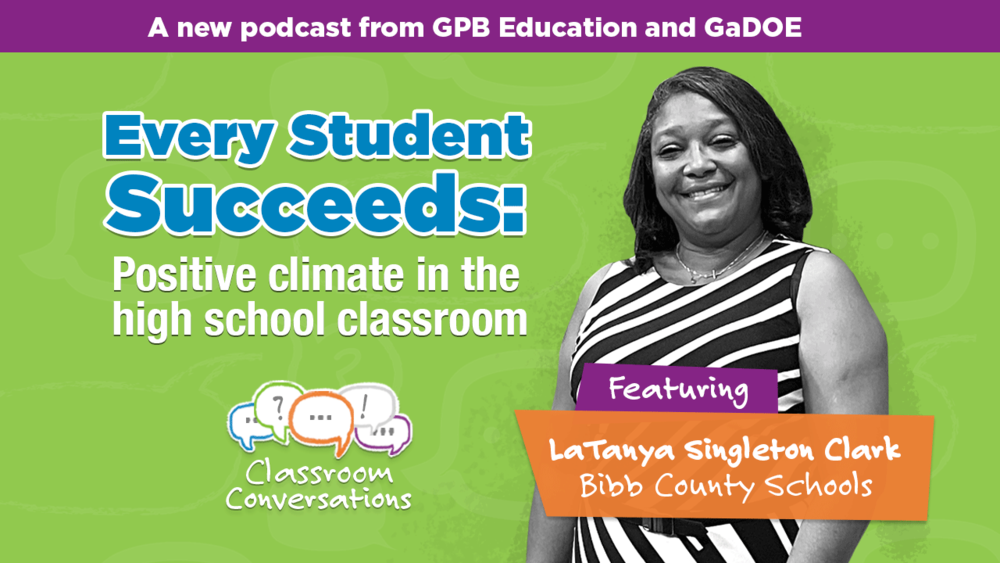
Section Branding
Header Content
Episode 105: Every Student Succeeds: Positive Climate In The High School Classroom
Primary Content
Bibb County teacher LaTanya Singleton Clark shares some strategies for how she makes connections with her students to help them learn, thrive, and succeed in school and beyond.

Click here for discussion guide!
TRANSCRIPT
Ashley Mengwasser: Hello. Hello. It's a beautiful day at GPB Studios. Well, I guess I can only speak for what's happening indoors because there are no windows to the outside world in here. I'm Ashley Mengwasser, and this is Classroom Conversations, the platform for Georgia's teachers. We hope you're enjoying our podcast series presented by the Georgia Department of Education in partnership with Georgia Public Broadcasting. Today's episode is another installment of positive classroom conversations with teachers. And in the spirit of up close and personal, this will be a one-on-one. Our teacher feature is from Northeast High School in Bibb County School District, hashtag Raider Nation. She's leaving such a positive mark. Her work with students has been described as awesome and impactful, and you've going to love her. Here from Macon to discuss her positive classroom is LaTanya Singleton Clark. Welcome, LaTanya.
LaTanya Singleton Clark: Hey.
Ashley Mengwasser: Hey, how are you feeling today?
LaTanya Singleton Clark: I'm feeling very good.
Ashley Mengwasser: Thanks for coming all the way from Macon.
LaTanya Singleton Clark: Absolutely.
Ashley Mengwasser: Well, to understand everything that you're about to share, we first need to understand your school. So can you just briefly describe Northeast High School for us?
LaTanya Singleton Clark: Oh, Northeast High School, we call it the pride of East Macon because it's the only school on that side of town. We have our feeder schools that feed into the elementary schools, feed into the middle school, and the middle school feeds into the high school all on one side of town. So we're always called the school across the river. Yes.
Ashley Mengwasser: So idyllic. Wonderful. And what's the culture there like?
LaTanya Singleton Clark: Great, upbeat culture because everyone basically knows each other from childhood and they just matriculate through school together. And it's great. It's wonderful because I even graduated from Northeast myself.
Ashley Mengwasser: I bet they love that. You're good PR, lady.
LaTanya Singleton Clark: That I am.
Ashley Mengwasser: You are. Well, let's just be transparent about all of your titles, shall we?
LaTanya Singleton Clark: Okay.
Ashley Mengwasser: I'll just list them here. CTAE Healthcare Science Teacher, CTAE Department Chair, Teacher Support Coach, and Bibb County School District Teacher of the Year.
LaTanya Singleton Clark: That's the best.
Ashley Mengwasser: Woo. Clap for that. Did I forget anything?
LaTanya Singleton Clark: No, I think you got everything.
Ashley Mengwasser: Okay. That's a lot. I don't know how you do it. We'll dive into that. But you know what sounds fun? A little LaTanya trivia, LTT.
LaTanya Singleton Clark: Okay. Let's play.
Ashley Mengwasser: I think we should do this rapid fire. And maybe we'll even have some music underneath. So just whatever comes to mind. Just blurt your answer. Let's begin. When and where were you when you decided to become a teacher, Latanya?
LaTanya Singleton Clark: I was at a previous job. I did healthcare for over 18 years. I was in radiology and I decided that, "I think it's time for me to go." I come from a family full of teachers. I was the black sheep. I went healthcare. I went to the left. But it was still coming at me, still pulling at me, still pulling at me.
Ashley Mengwasser: Calling to you.
LaTanya Singleton Clark: Calling my name, and I never regretted any of it. I absolutely love teaching.
Ashley Mengwasser: Beautiful. What is your favorite thing about being a teacher?
LaTanya Singleton Clark: Encouraging my students, being there for them, empowering them with knowledge that's going to take them further into the world.
Ashley Mengwasser: Name a time when your students laughed with or at you.
LaTanya Singleton Clark: Actually, it was recently... We laugh a lot together because we have great relationships, but this is homecoming week. So Monday was dressed in flashback '90s. So they was like, "Whoa, Ms. Singleton Clark. Okay. You chill. I like that. You understood the assignment." And we had '90s music playing in the hallway just to keep everything going. So we danced and had fun and just laughed together.
Ashley Mengwasser: That's beautiful. Name three words that your students would use to describe you.
LaTanya Singleton Clark: Supportive, tough, and loving. How about that?
Ashley Mengwasser: I love how those last two go together. What is one quote or bit of advice you're known for giving students?
LaTanya Singleton Clark: Positive thoughts plus positive energy creates positive results. So it's all about what you think will manifest into everything around you. So it starts with what your thoughts are.
Ashley Mengwasser: No wonder you have a positive classroom. And lastly, what is the of life? Just kidding. You never know who might know. So I just throw that in.
LaTanya Singleton Clark: I have no idea.
Ashley Mengwasser: Let's dive right into the high school experience. I loved mine, so much so, I cried and cried when it was over inside the car after graduation, just feeling those separation pains. I'm not sure that that's normal, but the point is that I loved it so much because you and teachers like you made the high school experience so special. And I loved my younger high school self. So I'm curious, what is your modern day high schooler like
LaTanya Singleton Clark: The students these days are very tech-savvy. So if I ever have issue because I'm less tech-savvy, if I ever have a issue with anything in the classroom, they'd be like, "I got you, Ms. Singleton Clark. Just don't get ruffled. I'll take care of that for you." And they're quick to take care of it, and they're quick thinkers too. So when you're teaching them, you got to keep them going, keep them engaged, but you got to be a quick pace with it, because you can lose them quickly because their minds work so quick.
And on the flip side of that, a lot of our students sometimes come from tough homes. So they carry a lot with them. And a lot of those things that they carry with them can block what they're learning when it comes in to the classroom. So you got to be with them and build those relationships with them to help them unblock whatever is going on in their minds or in their invisible backpacks and help unpack those so they can be successful in the classroom. It's all about building those relationships for your students to be successful.
Ashley Mengwasser: That's what you call the things that carry with them, the invisible backpack. Oh wow. What things might be in that invisible backpack?
LaTanya Singleton Clark: Well, you have home life, things that may go on at home, hunger, utilities out. They may be the primary care provider for their youngest siblings because their parents are working. And so they're living in survival mode. So when they're living in survival mode, sometimes education is tough grasping because they need to survive. But when you build those relationships with them and place them in those positive environments and fill their buckets with positivity, you are also showing them, it's a way that you can balance your backpack. You don't have to show me your backpack, but let me help you balance that invisible backpack because like we say, life happens, and as you continue to grow, life is going to continue to happen. But my sole job is to help you balance that backpack. But I need to also teach you what I need you to learn in my classroom.
Ashley Mengwasser: I think you've got it all figured out. That's a really good lesson. Well, I'm sure COVID times affected them even more than what they already carry in their invisible backpacks. So what struggles have you experienced at the high school level and how are you addressing your students' needs?
LaTanya Singleton Clark: The struggle that we're noticing is we have a learning gap right now because when students were out for COVID, it was like, boom, it happened all of a sudden. So the students had to jump from that face-to-face interaction, those hands-on interaction that let them get what they need to know, and to in front of a computer. And so it was a lack in the engagement piece of it. So you was having to try to keep them engaged, try to keep them excited. And then they're at home now. So they're having to be independent because their parents was at work. So they had to learn that independent skill to get up, get in front of the computer to do their work.
But a lot of students... I won't say quit, but they felt defeated because they couldn't grasp what they needed. And so they was disappointed in themselves. And so when they came back to school, we're having to help close that gap, that learning gap that had developed that... I mean, no one had control over that. The pandemic came out of nowhere. So they're frustrated, of course, because they're not where they want to be because kids want to be educated, and they get frustrated if they can't understand or get something. So their frustration levels are high, but that goes back to just continuing to be motivators for them and don't let them give up. But that's the only thing we're dealing with right now. But I think all schools across Georgia are doing great things to help try to bridge that learning gap that happen to us from COVID.
Ashley Mengwasser: So how you're addressing that is just by being positive, keeping them motivated. Anything else that you have to do day to day just to keep that going.
LaTanya Singleton Clark: Don't let them give up. Don't let them give up. Let them know that it's okay. We're going to get this. I'm going to meet you where you are. I know where I want you to be, but don't jump there to try to be there. Let me meet you where you are and help build you up to where you want to be and where I want you to be.
Ashley Mengwasser: We're going there together is your message.
LaTanya Singleton Clark: Exactly.
Ashley Mengwasser: Well, let's shift to the crux of this conversation. When we hear talk about creating a caring classroom environment, we often immediately think about elementary school. But how do you create that climate in a high school?
LaTanya Singleton Clark: In a high school, a lot of people, like you say, they feel like elementary school, but high schoolers need it too, because if you look at this generation, look at where they're reaching to for love. I often call this generation a loveless generation. They come to high school for safety. They come to high school for love. They come to high school for their needs. So we as teachers have to be there. I greet my students at the door to get a temperature check of... I know my students very well. I can tell when they're off. If they're off-
Ashley Mengwasser: Immediately.
LaTanya Singleton Clark: Immediately. If there's something off, we'll take a walk down the hall, we'll sit down and talk. I have a lounge area. Not my personal lounge area, but the school has a lounge area outside of my classroom. We'll sit there. We'll talk because if I can't get you to clear your head of whatever weight you're carrying, it's no way possible you're going to be able to learn and be a successful student that day.
But not only standing at the door doing temperature checks. In my classroom, on my desk, I have motivational stickers that I change out every three months. So they'll come in, they'll see a motivational sticker. I have motivational posters. I have learning curriculum posters too, but you'll also see motivational posters. I have music playing because students like music. I have my aroma therapy going.
Ashley Mengwasser: Did you happen to bring that with you today?
LaTanya Singleton Clark: I did not. I'm sorry. I shouldn't have brought you some. I'm sorry. But yes. It's like you just have to create a great learning environment.
Ashley Mengwasser: And you know what? All these things you're describing, they make me think of one word: therapeutic. It's really good for them as people. So you're able to literally clear the air with whatever they're bringing to school in their invisible backpacks, and then the learning can take root.
LaTanya Singleton Clark: Absolutely. You got it.
Ashley Mengwasser: Oh, that makes so much sense. Well, can we hear about a success story? I'm sure you have one or two students who have really benefited from your positive classroom climate. Take us there. Introduce us to these situations.
LaTanya Singleton Clark: For me, success stories is every day. Any day I can pour positivity or build a student is a success story for me. But I can go back to my first year when I started teaching. And I had this young man in my class. He would just come in just real quiet. He'll do his work, wouldn't engage in anything. But this was my first year teaching. So I'm all about engagement because I'm a high-strung teacher. You can tell. Yeah. And so then I just went down one day, then the class was doing their assignments, and I just squatted down beside him. I said, "Are you okay? I just noticed," da da da da. He was like, "Yo, Ms. Singleton, I'm good. I got you. I'm going to do your work. I promise. But just..."
Ashley Mengwasser: He was telling you to go away.
LaTanya Singleton Clark: He wasn't telling me to go away. He was just like, "Just let me do me." I said, "Okay." Well, he was a straight-A student. I can give you that. And so I took that. And that stuck with me all night. It just stuck with me because I didn't feel it as a push off. But I just felt like there's something with this kid. So I just kept watching his grades and everything, and then it came a time when I found out what was truly going on with him. And I always say this. Never judge a book by its cover because no matter if our students are in the streets, no matter if they're in gangs, no matter what goes on, because life outside of school still goes on. You still can't judge that book buys cover. Your sole job is to still teach and try to grab that child so that you can give them that educational experience they need so they can grow from whatever is holding onto them.
And so he wanted to quit. He was having a hard time. He wanted to quit, but I talked to him. I poured to him. I said, "If you keep coming every day, I promise I have you. You give me 10%. I give you 90%. Just don't quit."
Ashley Mengwasser: We'll make 100.
LaTanya Singleton Clark: Right. It was his senior year. "Don't quit. You've came this far." And when he walked across the stage... And it's like at graduation, we make a tunnel for our students. They walk through after they graduate. He walked up to me. He gave me the tightest hug. He said, "I appreciate you." And that meant the world to me.
Ashley Mengwasser: I can see it in your eyes.
LaTanya Singleton Clark: That meant the world to me.
Ashley Mengwasser: So you weren't deterred by what he said to you.
LaTanya Singleton Clark: No.
Ashley Mengwasser: It was a signal to you to pay attention.
LaTanya Singleton Clark: To pay attention, because he wasn't rude. He was not rude. And it's like, we just have to not wear our emotions on the sleeves, and more so try to see what they're screaming out for because they're saying something. We just have to be able to see what they're trying to say.
Ashley Mengwasser: So beautiful. I have tissues in my Mary Poppins bag. Speaking of Mary Poppins, I don't know. Have you seen the new movie, the Mary Poppins-
LaTanya Singleton Clark: I have not.
Ashley Mengwasser: I have to tell you this because something you said just made me think of it. You said you can't judge a book by its cover. There's a wonderful song in the new movie, and I think it goes something like, "The cover is not the book. Every chapter is what tells a story." And that's what you're saying about your students.
LaTanya Singleton Clark: Absolutely. Absolutely. I teach at a inner city school, a Title I inner city school. Our students have tough [inaudible 00:16:06]. So you just have to be what they need and meet them where they are because every student deserves a chance. Every student deserves a chance. Our jobs are to teach the students, to prepare them. Every student deserves a chance.
Ashley Mengwasser: And you perform that job valiantly every day. I can already tell. And let's talk about that. Let's go back to the teaching side and the curriculum at hand that you have to deliver every single day in the classroom. A classroom of students are relying on you and you have 14 jobs. I mean, we went over them. A lot is going on in your day, and that's true for so many teachers. So how do you balance making sure that the students are earning the credits they need to graduate with also addressing the wellbeing and the connectedness of the child? How do you do both?
LaTanya Singleton Clark: You have to know your students and build relationships with your students. Because as I stated before, they are carrying a lot. So you have to be there for them so that you can help them break away from the things they're carrying so it won't hinder them from learning. Because if you think about it, if a child comes to school hungry, how are they going to learn? You understand what I'm saying?
Ashley Mengwasser: Yes.
LaTanya Singleton Clark: So you have to build those relationships and just be their motivation. I keep everything in my office: food, deodorant, just everything, a sweater, just everything, because kids need stuff. You don't know where they're coming from. But you need them to be able to be successful. We need them to be successful in the classrooms. We want them to be successful on their exams. We want them to be successful stewards of the communities. So we have to prepare them for all of that and we have to make sure that they are okay as full rounded, not just academically rounded, but as a whole person.
Ashley Mengwasser: So sometimes for you and your students, that means you're meeting basic needs in the classroom in order to meet the learning needs and learning objectives.
LaTanya Singleton Clark: Absolutely.
Ashley Mengwasser: I totally get it. Well, I know you've already shared so many wonderful tricks and tips that you use in the classroom just to put their minds and hearts at ease so that they can and embrace the instruction. So bring it home for us, LaTanya. Our audience is rearing to go after this. We want to enlighten them with a teaching tip that our listeners can implement in their classrooms right away. And I know you have a really cool beginning of class strategy that you use when they first sit down. Take us through that. For your caring classroom.
LaTanya Singleton Clark: For my caring classrooms. One thing. I don't know if you all have heard about capturing kids' hearts, but always allow students to share good things that are going on in their life. At the top of each week, I have different motivational of quotes every week on the board when they walk in and I ask them to think about it. "How does it make you feel?" You just got to get through and just pour that positivity into them no matter what it takes. They need to see it and they need to hear it. And if they see it and hear it, they'll feel it. And just continue to be positive stewardess for them. Show them that it's going to be okay.
Everybody's having a tough time right now in education. We are. But we have to be there for those students because guess who's going to be taking care of us? They are. So we got to prepare them for it. So just get your motivation together. Find you some quotes. Get you some music, aromatherapy, your essential oils. Everything works. Trust me. You build that environment. If you go home, you have a little cozy environment that you can relax into. Think about that and bring that into your classroom for your students. That would help.
Ashley Mengwasser: That helps them.
LaTanya Singleton Clark: That helps.
Ashley Mengwasser: So you literally put a quote on the board.
LaTanya Singleton Clark: Every Monday.
Ashley Mengwasser: They all come in and sit down and Ms. Singleton Clark says, "We're talking about this quote. How does this make you feel?"
LaTanya Singleton Clark: Take a minute to read it. Take a minute to think about it. And now talk to me about it.
Ashley Mengwasser: And what kind of things come up in that conversation?
LaTanya Singleton Clark: Just like they'll say, "I can't quit," just depending on whatever the quote is on the board. Don't quit. Let your haters hate. I always throw different things in there. Stay positive. But it always brings it back to positivity. No matter what's going on, it's going to always bring it back to positivity.
Ashley Mengwasser: That's right because you have a positive classroom climate as we've been learning for the past few minutes. One of my favorite things you said when I first spoke to you, Latanya, was this quote. And I just want to make sure the teachers hear this. You said, "When you come into the classroom, don't just jump into the lesson. Jump into their hearts."
LaTanya Singleton Clark: Yes. Jump into their hearts. That's what you need to do.
Ashley Mengwasser: That's amazing. That's absolutely incredible. Thank you, LaTanya. Can I save your number if I just need some life guidance?
LaTanya Singleton Clark: Absolutely.
Ashley Mengwasser: Okay. Good. It's okay if you're like, "Lose my number. Lose my number." You are so caring and wonderful and I know your students benefit every day. Thank you for sharing your story. That's LaTanya Singleton Clark from Northeast High School. And I'm your host, Ashley Mengwasser. Thanks for listening to Classroom Conversations, the platform for Georgia's teachers. And remember, you're a great teacher. Goodbye for now.
